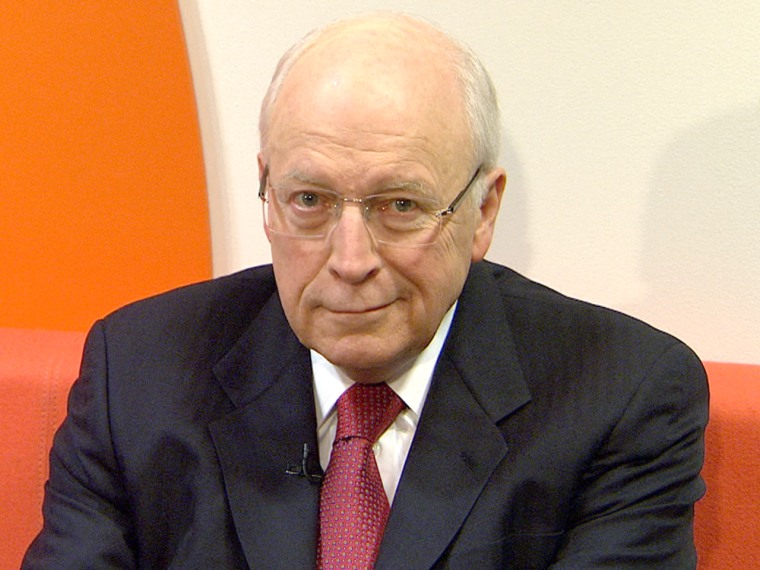Former Vice President Dick Cheney downplayed the rift created within his Republican party by the Tea Party, calling it a positive influence.
“It’s an uprising, in part, and the good thing is it’s taken place with in the Republican party. I don’t see it as a negative. I think it’s much better to have that kind of ferment and turmoil and change in the Republican party than it would be to have it outside,” he said Monday on TODAY.
Cheney said his daughter’s decision to launch a campaign to unseat U.S. Sen. Mike Enzi of Wyoming was “partly motivated” by concerns expressed by Tea Party members. Asked if he planned to help Liz campaign, Cheney said “I’ll do all that I can but probably the best thing I can do is stay out of the way.”
Tea Party members have raised concerns that many Americans have about taxes, national debt, health care and other issues they believe are not being addressed in Washington, he said.
“I think it’s a normal, healthy reaction and the fact that the party is having to adjust to it is positive. I’d much rather see them in the party than out of the party,” he said.
The Tea Party's opposition to the national health care program was seen as central to the 16-day government shutdown that disrupted the nation. But Cheney said that was a small price to make the nation face its global debts.
"I’m not a card-carrying member — I don’t know if there is a card — but I’ve got a lot of respect for what the people are doing," he said. "These are Americans. They’re loyal, they’re patriotic, they’re taxpayers and they’re fed up with what they see happening in Washington."
Dick Cheney opens up about facing death from a failing heart
Cheney cast blame on the White House for its role in the shutdown, saying "the most radical operator in Washington today is the president. I think he’s trying to take the country in a direction that’s fundamentally different than anything we’ve seen before."
Cheney also said that he doesn’t see the friction among Republicans as a sign of a true crack within the party.
“There are times when there’s a new wave, if you will, a new generation of political leaders coming along. The year I got elected (to the House) in 1978 we had a guy named Newt Gingrich who kept telling everybody we could become the majority, and he was right,” he said, referring to the former House Speaker who lead the 1994 “Republican revolution” when party members gained enough seats to take control of the U.S. House.
Cheney said he views his daughter's Senate campaign in a similar way to Gingrich's rise, pointing to her drive and energy "to represent that next generation, and we need to be passing on leadership in the party to that next generation," he said.
However, Liz Cheney’s campaign has put her father in an uncomfortable position since she is one of several upstarts running against friends and past colleagues of the former vice president. It also has put her at odds with some family members. Liz Cheney has said she opposes gay marriage, while her openly gay sister, Mary Cheney, recently married her long-time partner.
Cheney wouldn’t comment on whether the issue has caused tension between the siblings.
“If it did, I wouldn’t talk about it. That’s a family matter,” he said.
Cheney also spoke about the revelations he made in an upcoming book about his decades-long struggle with heart disease.
For example, Cheney revealed that in 2001 he submitted a letter of resignation to President Bush just in case he ever became incapacitated by a stroke or heart attack. That, he said, would allow the president to pick his replacement since there is no constitutional provision for handling the death of a vice president.
Cheney had the first of five heart attacks in 1978. He underwent a heart transplant in March 2012 and went into the surgery feeling comfortable with whatever might happen.
"It was strangely peaceful. I know it was anticipated after I had that many years of heart disease. Sooner or later, time or technology would run out on me," he said.
Since his surgery, Cheney said he has written the book, "Heart: An American Medical Odyssey," done a lot of hunting and fishing, and spent more time with his grandchildren.
"I wake up every morning with a smile on my face grateful for a day that I never thought I’d see," he said.
